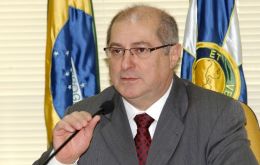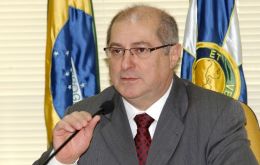MercoPress. South Atlantic News Agency
Tag: U.S. National Security Agency
-
Monday, June 29th 2015 - 06:08 UTC
Loathed at home, Dilma Rousseff tries to rebuild image among US investors

Brazil's President Dilma Rousseff met Sunday with investors in New York on the first day of a long-delayed US visit aimed at overcoming strains caused by the NSA spying scandal. Revelations two years ago that the US National Security Agency electronically eavesdropped on Rousseff's email and other communications prompted her to angrily call off an official visit to Washington that had been set for October 2013.
-
Friday, April 17th 2015 - 04:12 UTC
Malvinas Secretary Filmus to talk about Falklands and oil in London

Argentina's Secretary for Malvinas Islands Affairs, Daniel Filmus will be giving a conference on Friday in London on the Falkland Islands sovereignty dispute with the UK and the current round of oil drilling offshore the Islands, in what Argentina considers its territory.
-
Tuesday, April 7th 2015 - 06:25 UTC
Falklands/Malvinas war documents declassified; Argentine Defense ministry has 30 days to make them available

The Argentine government on Monday officially declassified secret files relating to the country's 1982 war with Britain over the Falkland Islands. The Defense Ministry has 30 working days to establish a mechanism for members of the public to consult the records, according to a resolution published in the official gazette.
-
Sunday, December 29th 2013 - 08:24 UTC
One for the White House: NSA program keeping phone call records is 'lawful'

A federal judge ruled that a National Security Agency program that collects records of millions of Americans' phone calls is lawful, calling it a “counter-punch” to terrorism that does not violate Americans' privacy rights.
-
Wednesday, December 18th 2013 - 06:43 UTC
First ruling against US government 'metadata' collection; Obama meets top technology companies leaders

A US judge has ruled the National Security Agency's mass collection of telephone data may be unconstitutional. Federal District Judge Richard Leon said the electronic spy agency's practice was an “arbitrary invasion”.
-
Thursday, September 5th 2013 - 02:36 UTC
Brazil to probe telecom companies for possible sharing of info with US spies

Brazil will probe telecommunications companies to see if they illegally shared data with the United States National Security Agency after it was found the US had been spying on President Dilma Rousseff. Brazil’s government has accused the US of lying about the NSA’s activities in the country.
-
Saturday, August 3rd 2013 - 02:49 UTC
Cristina Fernandez will chair Security Council debate on UN relations with regional organizations

Argentine president Cristina Fernandez will be chairing next Tuesday a meeting of the United Nations Security Council that will be addressing the relations of Latam and Caribbean regional and subregional organizations with UN in helping prevent conflicts and restore peace, was announced by the Argentine ambassador Maria Cristina Perceval.
-
Monday, July 15th 2013 - 14:53 UTC
Brazil: internet providers will have to store domestic communications in the country

Brazil may soon require global Internet service providers (ISPs) to store domestic communications data in the country in response to reports that the US widely spies on telephone and Internet traffic across Latin America.
-
Tuesday, July 9th 2013 - 06:17 UTC
Brazil investigating if telecom companies cooperated with the US spying program

Brazil began an investigation Monday into whether telecommunications firms operating in the country cooperated with the U.S. as part of a spying program that has collected data on billions of telephone and email conversations. Anatel, the government agency that regulates the telecom sector in Brazil, said in a note that it's working with federal police and other government agencies on the investigation.
-
Tuesday, July 9th 2013 - 00:01 UTC
Brazilian Congress wants to question ambassador about US surveillance in the country

Lawmakers in Brazil said Monday they want to question Washington's ambassador here about revelations that the United States has collected and stored the e-mail and telephone records of millions of Brazilians.
